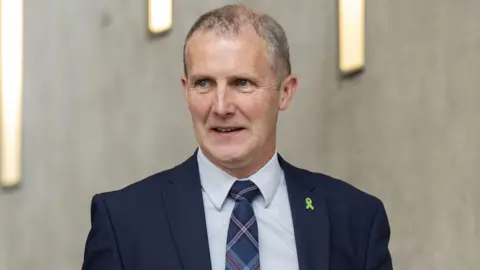'Room for negotiation' on national care service plan - Gray
The Scottish government's health secretary has said he wants to "get back around the table" with councils regarding plans for a national care service - despite local authorities voting to withdraw their support from it.
Neil Gray told BBC Scotland's The Sunday Show that he felt Cosla, the local council umbrella body, had made a "pre-emptive" decision regarding the scheme.
He said there was still "room for negotiation" regarding the plan, which has been hit by a series of setbacks since it was first proposed in August 2021.
The plan would see social care responsibility transferred from councils to a new national service, benefitting elderly, disabled and homeless people, among others.
'A need for reform'
Cosla stated last week that it had concerns about the proposed legislation and that organisations within the care sector had also expressed doubts about the changes, while the GMB and Unison unions also pulled their support recently.
However, Gray told BBC Scotland he believed the bill could still go ahead.
He said: "I want [the national care service] brought into being as quickly as possible because I can understand the need that is out there, I can see it from the service users that I speak to - that's why I want to get back around the table with local government and find a way forward."
Gray added: "We are all in agreement I believe that there is a need for reform, a need for change and that is what I am determined we can deliver."
The health secretary said the proposals were "not about centralisation" but focused on ensuring there were "consistent standards" across the country.
Cosla has previously expressed concerns that the bill did not represent the work councils had contributed to the scheme.
The decision to withdraw support was then criticised by social care minister Maree Todd as showing "total disregard" for people in the sector.
However, Gray took a more conciliatory tone.
He said: "I had paused elements of the amendments that were to come forward over the summer at the request of Cosla, so that they could focus on reducing the delayed discharge figures that we are wrestling with at the moment.
"So I think it's slightly pre-emptive for leaders to have taken this decision, but I am still open to discussion because we both need to see reform coming through."
He added he understood Cosla members had "strongly held views" and there was a "growing need for social care services" in Scotland.
'Dead in the water'
Scottish Conservative health spokesman Dr Sandesh Gulhane said Gray was "in denial" about the plan being "dead in the water".
He said: "It’s just common sense that social care is best delivered by local providers, who know what works in their area and how much money they need to deliver.
“It’s time he finally pulled the plug on this unaffordable scheme and diverted every spare penny to local care providers.”
Scottish Labour's health spokeswoman Jackie Baillie said Gray's comments showed "this arrogant SNP government is still refusing to listen".
She added: "The SNP must go back to the drawing board and set out real plans to improve our social care system."
 PA Media
PA MediaThe Scottish government described the bill as being the "biggest public service reform in Scotland since devolution", and said it would streamline the care process for elderly, disabled or homeless people, as well as those with addictions, families and unpaid carers.
The system would let people switch between different types of care as their needs changed.
Originally the bill was planned to have been introduced by the end of the 2026 parliamentary term. But in December 2023, the then-health secretary, Michael Matheson, said it was delayed until 2028/29.
Earlier this month, unions withdrew their support - with GMB Scotland's senior organiser Keir Greenaway telling the BBC that the scheme would only add more bureaucracy to the sector.
